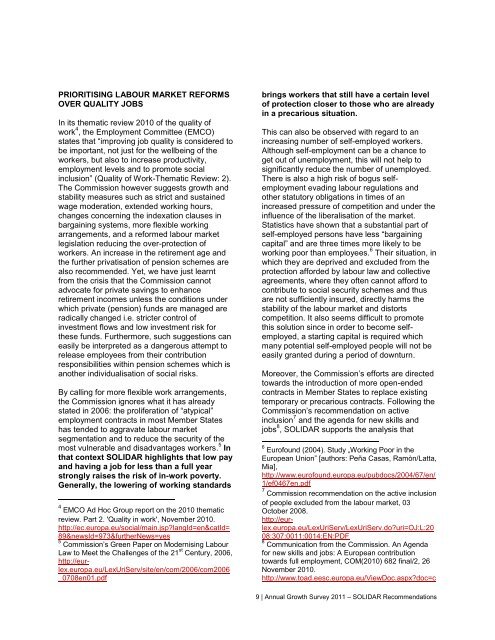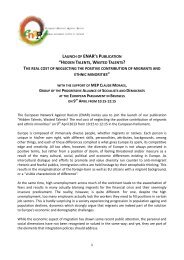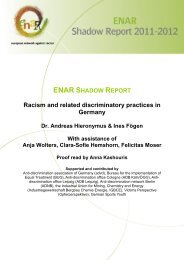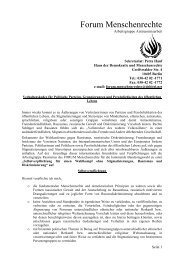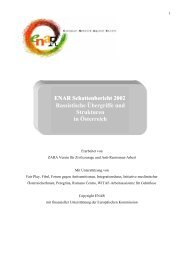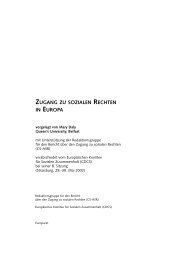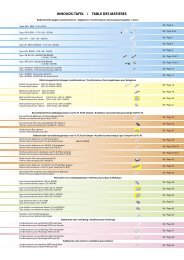Annual Growth Survey 2011 ? SOLIDAR Recommendations
Annual Growth Survey 2011 ? SOLIDAR Recommendations
Annual Growth Survey 2011 ? SOLIDAR Recommendations
Create successful ePaper yourself
Turn your PDF publications into a flip-book with our unique Google optimized e-Paper software.
PRIORITISING LABOUR MARKET REFORMS<br />
OVER QUALITY JOBS<br />
In its thematic review 2010 of the quality of<br />
work 4 , the Employment Committee (EMCO)<br />
states that “improving job quality is considered to<br />
be important, not just for the wellbeing of the<br />
workers, but also to increase productivity,<br />
employment levels and to promote social<br />
inclusion” (Quality of Work-Thematic Review: 2).<br />
The Commission however suggests growth and<br />
stability measures such as strict and sustained<br />
wage moderation, extended working hours,<br />
changes concerning the indexation clauses in<br />
bargaining systems, more flexible working<br />
arrangements, and a reformed labour market<br />
legislation reducing the over-protection of<br />
workers. An increase in the retirement age and<br />
the further privatisation of pension schemes are<br />
also recommended. Yet, we have just learnt<br />
from the crisis that the Commission cannot<br />
advocate for private savings to enhance<br />
retirement incomes unless the conditions under<br />
which private (pension) funds are managed are<br />
radically changed i.e. stricter control of<br />
investment flows and low investment risk for<br />
these funds. Furthermore, such suggestions can<br />
easily be interpreted as a dangerous attempt to<br />
release employees from their contribution<br />
responsibilities within pension schemes which is<br />
another individualisation of social risks.<br />
By calling for more flexible work arrangements,<br />
the Commission ignores what it has already<br />
stated in 2006: the proliferation of “atypical”<br />
employment contracts in most Member States<br />
has tended to aggravate labour market<br />
segmentation and to reduce the security of the<br />
most vulnerable and disadvantages workers. 5 In<br />
that context <strong>SOLIDAR</strong> highlights that low pay<br />
and having a job for less than a full year<br />
strongly raises the risk of in-work poverty.<br />
Generally, the lowering of working standards<br />
4 EMCO Ad Hoc Group report on the 2010 thematic<br />
review. Part 2. 'Quality in work', November 2010.<br />
http://ec.europa.eu/social/main.jsp?langId=en&catId=<br />
89&newsId=973&furtherNews=yes<br />
5 Commission’s Green Paper on Modernising Labour<br />
Law to Meet the Challenges of the 21 st Century, 2006,<br />
http://eurlex.europa.eu/LexUriServ/site/en/com/2006/com2006<br />
_0708en01.pdf<br />
brings workers that still have a certain level<br />
of protection closer to those who are already<br />
in a precarious situation.<br />
This can also be observed with regard to an<br />
increasing number of self-employed workers.<br />
Although self-employment can be a chance to<br />
get out of unemployment, this will not help to<br />
significantly reduce the number of unemployed.<br />
There is also a high risk of bogus selfemployment<br />
evading labour regulations and<br />
other statutory obligations in times of an<br />
increased pressure of competition and under the<br />
influence of the liberalisation of the market.<br />
Statistics have shown that a substantial part of<br />
self-employed persons have less “bargaining<br />
capital” and are three times more likely to be<br />
working poor than employees. 6 Their situation, in<br />
which they are deprived and excluded from the<br />
protection afforded by labour law and collective<br />
agreements, where they often cannot afford to<br />
contribute to social security schemes and thus<br />
are not sufficiently insured, directly harms the<br />
stability of the labour market and distorts<br />
competition. It also seems difficult to promote<br />
this solution since in order to become selfemployed,<br />
a starting capital is required which<br />
many potential self-employed people will not be<br />
easily granted during a period of downturn.<br />
Moreover, the Commission’s efforts are directed<br />
towards the introduction of more open-ended<br />
contracts in Member States to replace existing<br />
temporary or precarious contracts. Following the<br />
Commission’s recommendation on active<br />
inclusion 7 and the agenda for new skills and<br />
jobs 8 , <strong>SOLIDAR</strong> supports the analysis that<br />
6 Eurofound (2004). Study „Working Poor in the<br />
European Union” [authors: Peña Casas, Ramòn/Latta,<br />
Mia],<br />
http://www.eurofound.europa.eu/pubdocs/2004/67/en/<br />
1/ef0467en.pdf<br />
7 Commission recommendation on the active inclusion<br />
of people excluded from the labour market, 03<br />
October 2008.<br />
http://eurlex.europa.eu/LexUriServ/LexUriServ.do?uri=OJ:L:20<br />
08:307:0011:0014:EN:PDF<br />
8 Communication from the Commission. An Agenda<br />
for new skills and jobs: A European contribution<br />
towards full employment, COM(2010) 682 final/2, 26<br />
November 2010.<br />
http://www.toad.eesc.europa.eu/ViewDoc.aspx?doc=c<br />
9 | <strong>Annual</strong> <strong>Growth</strong> <strong>Survey</strong> <strong>2011</strong> – <strong>SOLIDAR</strong> <strong>Recommendations</strong>


